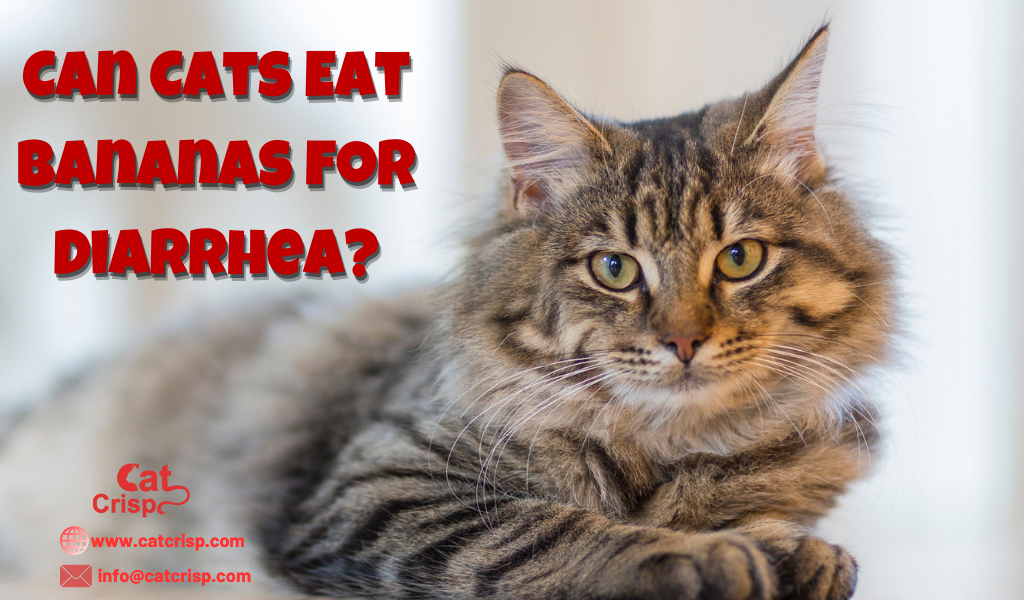Today I will share with you, can cats eat bananas for diarrhea? As responsible pet owners, we often find ourselves questioning the suitability of various human foods for our feline friends.
One common query is whether can cats eat bananas, especially if they are experiencing digestive issues like diarrhea. This article delves into the potential benefits and risks of feeding bananas to cats, particularly when they are suffering from diarrhea.

Table of Contents
ToggleUnderstanding Diarrhea in Cats
Diarrhea in cats can be caused by a variety of factors, including dietary indiscretion, infections, stress, and underlying health conditions. It is characterized by frequent, loose, or watery stools, which can lead to dehydration and nutrient deficiencies if not addressed promptly.
If your cat is experiencing persistent or severe diarrhea, it is essential to consult a veterinarian.
Also Read: My Cat Has Diarrhea and is Throwing Up
Nutritional Profile of Bananas
Bananas are a popular fruit known for their rich nutritional content. This fruit is good source of vitamins and minerals.
Given these nutrients, bananas can be a healthy snack for humans, but the question remains: are they suitable for cats, especially those with diarrhea?
Can Cats Eat Bananas?
In general, bananas are not toxic to cats. However, cats have different dietary needs compared to humans, and their digestive systems are not designed to process large amounts of plant-based foods.
While an occasional small piece of banana may be safe for most cats, it should not become a regular part of their diet.

Potential Benefits of Bananas for Cats with Diarrhea:
Fiber Content: The dietary fiber in bananas may help add bulk to the stool, potentially alleviating mild diarrhea. However, cats are obligate carnivores, meaning their digestive systems are more efficient at processing animal-based proteins rather than plant fibers.
Electrolytes: Potassium in bananas can help replenish electrolytes lost during episodes of diarrhea. Maintaining electrolyte balance is crucial for preventing dehydration and supporting overall health.
Potential Risks of Bananas for Cats with Diarrhea:
Digestive Upset: While fiber can be beneficial, too much fiber can actually worsen digestive issues in cats. Bananas, being high in carbohydrates and fiber, can potentially lead to gas, bloating, or even more severe diarrhea.
Sugar Content: Bananas contain natural sugars, which are not a necessary part of a cat’s diet. Excessive sugar intake can lead to weight gain, diabetes, and other health problems over time.
Choking Hazard: Pieces of banana that are too large can pose a choking risk, especially for smaller cats.
Best Practices for Feeding Bananas to Cats
If you decide to offer your cat a small amount of banana, follow these guidelines to minimize any potential risks:
Consult Your Veterinarian: Before introducing any new food to your cat’s diet, especially if they are experiencing health issues like diarrhea, consult with your veterinarian. Based on your cat’s specific needs, the Veterinarian will provide personalized advice.
Moderation is Key: Offer only a tiny piece of banana (about the size of a fingertip) as an occasional treat. Monitor your cat’s reaction and discontinue if you notice any adverse effects.
Proper Preparation: Peel the banana and cut it into small, manageable pieces. Avoid giving your cat banana peels, as they are difficult to digest and can cause gastrointestinal blockages.
Observe and Monitor: After giving your cat a small piece of banana, observe them for any signs of digestive upset or allergic reactions. If diarrhea worsens or other symptoms appear, contact your veterinarian immediately.
Alternative Remedies for Cat Diarrhea
While bananas may offer some temporary relief, they are not a cure for diarrhea in cats. Here are some alternative remedies and strategies that may help:
Hydration: Ensure your cat stays well-hydrated. Provide fresh water at all times and consider offering an electrolyte solution recommended by your veterinarian.
Bland Diet: A bland diet consisting of boiled chicken and rice (without seasoning) can help soothe the digestive system and firm up stools. Gradually reintroduce regular food once the diarrhea subsides.
Probiotics: Probiotics can help restore the balance of healthy gut bacteria, which can be disrupted during episodes of diarrhea. Consult your veterinarian for appropriate probiotic supplements for cats.
Pumpkin: Plain canned pumpkin (not pumpkin pie filling) is another source of fiber that can help with mild diarrhea. Mix a small amount (about a teaspoon) into your cat’s food.
Veterinary Care: For persistent or severe diarrhea, seek veterinary care. Your veterinarian can perform diagnostic tests to determine the underlying cause and prescribe appropriate medications or treatments.
Conclusion
While bananas are not toxic to cats, they are not an ideal remedy for diarrhea. Their fiber content may provide temporary relief, but the potential risks, such as digestive upset and high sugar content, outweigh the benefits.
It is always best to consult with a veterinarian before introducing new foods to your cat’s diet, especially when dealing with health issues like diarrhea.
Addressing the root cause of diarrhea and providing supportive care through hydration, a bland diet, and appropriate veterinary treatments are the most effective ways to ensure your cat’s digestive health.
While bananas can be an occasional treat for healthy cats, they should not be relied upon as a solution for diarrhea.

